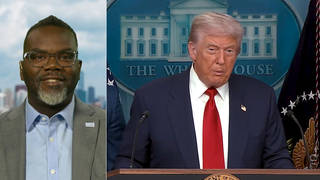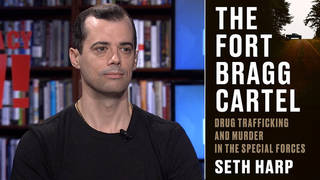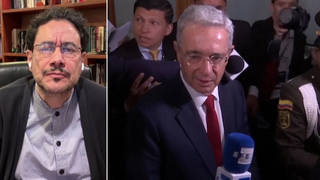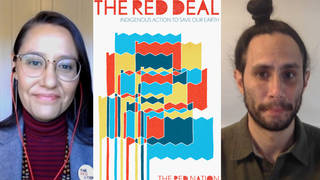
On Earth Day, Democracy Now! revisits a 2010 conversation with world-renowned environmentalist Vandana Shiva and her sister, Dr. Mira Shiva, about multinational malpractice in India, from the Union Carbide disaster in Bhopal to Monsanto GMOs that are destroying biodiversity.
AMY GOODMAN: We’re joined by Vandana Shiva, who is well known around the world for her work as an environmentalist, as an eco-feminist. We are also joined by her sister, Dr. Mira Shiva. She is with Health Action International, other international groups, and she particularly deals with healthcare and bioengineered food.
Vandana, why don’t you introduce us to Dr. Shiva, your sister?
VANDANA SHIVA: Well, first is, of course, Mira is my very inspiring elder sister and decided long ago that she would do medicine, for healing people. That’s why she is not in the United States of America, even though she went to the best medical school — all her colleagues are here — because it was not medicine for money, but medicine for service. And for the last 35 years, Mira has served the poorest of the country through community health and fought the biggest pharmaceutical giants, including the Carbides of the world, who dumped toxics in Bhopal. So I have huge admiration and love for Mira. And Mira is often called the Ralph Nader of India.
AMY GOODMAN: Mira, talk about your work in India.
DR. MIRA SHIVA: My work has been basically to ensure, you know, the healthcare access. And for that, one realized that the initial bit was, you know, community health-related work in the areas like the tribal areas, the peripheral areas, where the access to healthcare was very, very poor. Then the second bit, one realized that unless you had policies where the health budget was adequate — like ours is only one percent; 80 percent of healthcare is out of pocket, people have to pay. And you have to — if you have 77 percent of your people earning less than 20 rupees a day, which is less than half a dollar a day, food, access to food, access to medicine, all this is going to be a problem. So, from education and training and working, you know, with the marginalized groups, have had to include the issue of policy, public policy, intervention.
And in the meantime, some of the tragedies, you know, which we called man-made, like the Bhopal gas disaster happened, and then one saw how these things are handled. And if you want, I can just add a bit. Like, it happened on the night of the 2nd and the 3rd of December, 1984. We had — none of us had any idea what was the gas. We had no idea how to deal with it. None of the doctors had any idea. The only people he knew what were the gases was Union Carbide. And I can say that in a short while, we got hold of a telex, which was sent by the Union Carbide medical director from States to the UCIL, which is Union Carbide India Limited, that if you see cyanide-like poisoning, give sodium thiosulfate.
Now, sodium thiosulfate is the antidote for cyanide poisoning. And the autopsies were showing, you know, the multi-system involvement was there, because the gases caused cyanogen pool. So it was not just the eyes and the lungs, but it was your immune system. It was from your reproductive system, so infertility, abortions, whole lot of things like that. Liver, kidney, neurological, multi-sytemic involvement. And autopsies showed bright red lungs and bright red —- you know, the blood, which meant cyanide-like poisoning. But because it would have meant compensation problems, legally, and that entire information, that sodium thiosulfate was the antidote, was suppressed. So, for me, many of us who are involved in public health, this was one of the biggest medical crimes, because denial -—
VANDANA SHIVA: And there are trade secret issues.
DR. MIRA SHIVA: Yes. And also, denial of the treatment, because, you know, the thousands that died, and thousands who have irreversible damage of the multiple [inaudible], could have been avoided, had they been given the correct treatment, had the question of compensation and legal thing not, you know, basically sidelined or covered up the entire objective, you know, dealing with the problem. First of all, the way the thing was put up, what the gases were, what the chemicals were.
And of course, the tragedy continues, because then you just — one year later, the health impact, five years later, 10 years later, that — what has been the health impact on the people, have been part of the International Medical Commission. But now, the toxic influence of the mercury, cadmium, etc., which are lying there, are seeping into the subsoil water and have been resulting in birth of malformed babies, teratogenic effect, which was there earlier because of the gas, now it’s just the toxic influence. So the sludge, which has been covered up, the sludge, the poisons are seeping in.
So, the cleaning up of that — now, Union Carbide has sold that to Dow Chemical. So, for the justice of the Bhopal victims, the question of cleanup, who will do the [cleanup]? So, the issues of corporate responsibility come in. That’s another, of course, issue of pharmaceuticals and medicines.
JUAN GONZALEZ: And also the issue of, as you were saying, public policy, what the government’s role, the courts’ roles in India, in terms of —
DR. MIRA SHIVA: Yes, definitely. Definitely, I say that that has been the health bit — you know, decreasing the level of the crime from, you know — from the issue, murder to negligence, that has happened, which has been very, very unfortunate. And the compensation being given to the people, it’s so measly, so measly, because if you — people are going to have cancer, they’re going to have babies born who are malformed, how does the mother look after? You know, and 25,000 is nothing.
AMY GOODMAN: Twenty-five thousand dollar — rupees?
DR. MIRA SHIVA: Rupees, rupees.
VANDANA SHIVA: No, $250 a person, average.
AMY GOODMAN: Now, it’s interesting. You, Vandana Shiva, have signed on to a letter of human rights activists, led by Abdul Jabbar, the prominent Bhopal activist, to President Obama, applauding him on taking a tough stance towards BP, British Petroleum, but saying the same stance should be taken to a company that’s not based in Britain, but in President Obama’s own country, the United States of America. And that is Union Carbide/Dow. Can you talk more about that?
VANDANA SHIVA: Yeah, of course, you know, there are about six strong victims’ groups that have maintained this fight over — for justice over 26 years. Abdul Jabbar is part of the Mahila —- the women’s -—
DR. MIRA SHIVA: Stationery Karamchari Sangh.
VANDANA SHIVA: Stationery Karamchari Sangh. And the decision, the verdict on Bhopal, came at the same time, with this oil spill issue of liability, you know, that right now BP has put down $2 billion, but they are anticipating $20 billion, in terms of liability cases. And here was President Obama saying, “We’re going to their boot on — our boot on their necks, and we’re going to make sure they give justice to our people.” And at the same time, exactly the same time, pressure was being put to not allow the Bhopal issue to continue and to seal it forever. There was a CEOs Forum, and part of the conditionality of the CEOs Forum for U.S.-India, corporate, was shut Bhopal forever. The point is, Bhopal injustice is linked to corporate crimes post-Bhopal. We got a horrible new DuPont nylon plant, which was fought vigorously by the people of Goa. Conditionality: no liability linked to Bhopal. You know, after Bhopal, they wanted to make sure Enron, which failed, no liability.
And now, there’s — the Bhopal judgment is being linked totally to the civil nuclear liability bill. As you know, the Bush administration signed an agreement with our government, the nuclear agreement. One would have imagined President Obama would not follow it through, because it was a Bush deal. But he has maintained support for it. And the only way — I mean, we just had — today I’ve just received information of a leak from one of our atomic power plants, the Tarapur power plant. Atomic power plants have accidents. Nuclear power plants have accidents. There’s a new civil nuclear liability bill being pressurized from the United States, from the Obama administration. And guess what the liability on the corporations in that is. It’s a bill for putting a ceiling on liability: $100 million, no matter what the disaster, $100 million.
AMY GOODMAN: And the reason the U.S. is involved is it’s selling equipment to India?
VANDANA SHIVA: It is opening up the market. You know, nuclear energy — I started my career in nuclear energy — it’s been a state subject, in fact been a strategic sphere in India. But the U.S. nuclear deal turned it into a, quote, “open private market.” And all the General Electrics and the Westinghouses, they’re waiting. But they want to invest only if they have freedom from liability. And that’s why the Bhopal case is so important, no matter what sphere we look at. And the companies know there’ll be disasters. They want to cut costs. And if they cut costs, with liability, they’re going to have to pay up later for an accident, so they want cutting costs, maximizing profits, and no liability. And I do feel, right now, the issue of liability, corporate liability, is the heart of the health movement, and it’s definitely at the heart of the environment movement.
JUAN GONZALEZ: And as you were saying, the Obama administration is not only pressing for more nuclear plants here, but obviously it’s doing so around the world. And, of course, Exelon was —- from his home state, the manager of the largest number of nuclear plants in the United States, was a major contributor -—
VANDANA SHIVA: To funding?
JUAN GONZALEZ: — to the Obama administration from the very beginning.
VANDANA SHIVA: The market we’re talking about in India for the nuclear energy industry is $50 billion to $100 billion. So that’s what’s they’re seeking. But at the heart of it lies the issue of liability. And the civil nuclear liability bill, which is being fought by parliament —- the parliamentarians are saying no, the movements are saying no, that if we’ve already allowed 25,000 people to be killed in Bhopal, 500,000 to be maimed for life -—
DR. MIRA SHIVA: And they’re continuing. It’s not going to stop.
VANDANA SHIVA: And they’re continuing. And it’s not every second day there’s news of nuclear leaks, nuclear disasters. With all of that knowledge, to try and shift energy policy, impose an energy policy on India, from safe, renewable, solar, wind, biomass, to nuclear, with a civil nuclear liability bill putting a ceiling on $100 million, when you’re willing to force BP to give $20 billion — and obviously, the number of lives lost in an accident in India, much more because we have more people. And I want to take us back to Lawrence Summers in 1992, a summit, where he said, “Let’s export our hazards to the third world, because life is cheaper.”
AMY GOODMAN: He signed a memo.
JUAN GONZALEZ: Right.
VANDANA SHIVA: He signed a memo. And I think this —
AMY GOODMAN: Which he later said was satiric.
VANDANA SHIVA: Yeah, but the point is, the policies are still designed on that logic: take hazards to where the poor are.
JUAN GONZALEZ: I’d like to ask about a victory for a change, in terms — the victory that you were involved in, in terms of Bt brinjal eggplant in India. Could you talk about that?
DR. MIRA SHIVA: See, the eggplant — I will talk a little bit about what eggplant means to us. See, the eggplant is not in different parts of the country. The dishes are different. You make eggplant in a different, different way. And we have small ones, big ones, round ones. You chop and, you know, all kinds of thing. The question of this Bt brinjal, with the Bacillus thuringiensis, which produces pesticide continuously, which has basically — in the engineering bit of it, they have three there. There’s Bt, the Bacillus thuringiensis, is the genes which will produce pesticide. They have antibiotic resistant marker, another gene. And then cauliflower mosaic virus gene to make it functioning more.
AMY GOODMAN: Bigger.
DR. MIRA SHIVA: Yeah.
AMY GOODMAN: Wait, so these things are —
VANDANA SHIVA: No, no.
DR. MIRA SHIVA: No, no.
VANDANA SHIVA: It’s for pumping up the expression. It’s called a viral promoter.
DR. MIRA SHIVA: Expression. So, actually, there are three genes. And people say one gene will do one thing. That’s not true, because the genes, they have effect on different parts. So, it’s like —
JUAN GONZALEZ: And this is all produced by Monsanto.
DR. MIRA SHIVA: This is produced — but like, in general. Like, you know, one chemical will work on this, but they never said — like antibiotic, it will do this, but they never said adverse effects will be this on different organs. So, just like this, that when they’re dealing with the genes, they do many, many things. So, antiobiotic-resistant marker, they’ve used the antibiotic kanamycin, which is used as a second-line drug for tuberculosis. Now, we have 10 million people with tuberculosis, 2.5 million infectious, multi-drug-resistant in TB. How can you use things? So, if you’re having —- and -—
AMY GOODMAN: I’m having some trouble understanding. I mean, you two are scientists, so just to say.
DR. MIRA SHIVA: OK.
AMY GOODMAN: When you say this Bt, that in this eggplant, one has an insecticide in it, you’re saying it is groomed to ward off insects.
VANDANA SHIVA: No, to produce a toxin. But the Bt cotton experience has already shown that it is not controlling pests. The pests are evolving resistance.
AMY GOODMAN: And the other one has this antibiotic resistance.
VANDANA SHIVA: It’s the same.
AMY GOODMAN: The same eggplant also has.
VANDANA SHIVA: In the eggplant, in the eggplant, yes.
DR. MIRA SHIVA: They have three sets of genes.
AMY GOODMAN: And what’s that for? What’s the intention of it, the antibiotic resistance?
VANDANA SHIVA: Well, the antibiotic resistance marker is really because the technology is so crude and unreliable that when you shoot a gene, or you infect — in this case, it’s an infection with cancer — you’re not sure, of the thousand cells, all of them will absorb the toxin gene.
AMY GOODMAN: But what’s the point of it? Why do they put it in?
VANDANA SHIVA: So you have to separate, because there will be failures.
DR. MIRA SHIVA: So, the ones that don’t have the gene in it, then when you have the antibiotic resistance, the others will be knocked off.
AMY GOODMAN: But tell us why does Monsanto do it. What does it — what’s its selling point?
VANDANA SHIVA: Because of the failure of the technology, you have a thousand cells into which you shoot the toxic gene in. But only five percent will absorb it. So instead of growing out the thousand cells into plants and most of them not having the trait you want to introduce, you put antibiotic resistance markers to separate the cells that absorb the gene.
AMY GOODMAN: But what’s the point of this gene?
VANDANA SHIVA: To separate, because then you pour the antibiotic on the cells —
DR. MIRA SHIVA: Others be dying.
VANDANA SHIVA: — and the ones that did not absorb the introduced gene die, because they don’t have the resistance marker, and those that absorb the resistance marker survive. And it’s really a reflection of the fact that the technology doesn’t work as a reliable technology. But as Mira is saying, now you’re putting antibiotic resistance markers into our food, these are going to — these genes will jump, and we will have antibiotic resistance.
DR. MIRA SHIVA: So, the horizontal —
JUAN GONZALEZ: This is a Frankenstein mushroom that they’re creating.
DR. MIRA SHIVA: No. So, the horizontal gene transfer, you know, because if you have E. coli, you’ve got a whole lot of bugs inside you. They have [inaudible] — you know, they’re not pathological. Anyway, the long and short of it is, there are Vedic doctors. They use some of this eggplant, aubergine, which is as part of treatment for many conditions. It’s part of the Ayurveda. You know, it’s a system of medicine. So they say, “If you’re going to have pesticide producing, you know, this Bt brinjal, what happens to our system of medicine?” Because once you have the patented product, because intellectual property right is going to be linked with this, so all the others are going to be bought up or be out of the market. So, what effect on the other systems of medicine?
And the effects of using the Bt as a technology, the studies that have been done in different parts, they have shown — they, the biosafety studies and all, have been done for a long time — that the progeny, that they have found that it’s either smaller, the mortality of the progeny is —- you know, they don’t survive much. But infertility -—
AMY GOODMAN: The eggplant.
DR. MIRA SHIVA: No, animal studying —
VANDANA SHIVA: No, the feeding, feeding studies.
AMY GOODMAN: The people who eat the eggplant.
VANDANA SHIVA: The rats that have been fed.
DR. MIRA SHIVA: But they’re using, like, you know, not the aubergine itself. The technology of Bt, you know. And so, like Dr. Irina Ermakova, she had done — and she has — had fed the maize. Now, I’m just talking about the different, different gene-related studies that have been done.
VANDANA SHIVA: Because the Bt is in maize, the Bt is in canola. So the Bt, you know, this gene that produces a toxin, has been introduced into many crops, Bt cotton. And now it is Bt eggplant, which we’ve stopped.
DR. MIRA SHIVA: Which is now. But those studies have shown infertility in the generation later. Now if you say infertility, and we are eating brinjal all the time, so — and you’re going to be eating many of these things, many crops, all the time. Then, what happens, the effect, the cumulative toxic effect? So not only that effect on the immune system, the liver, the kidney, numerous systems.
And here they’ve done the biosafety study for 90 days, and they say, “Safe, safe.” You say, “Excuse me. What about, you know, the teratogenic effect, intergenerational? You have to feed two, three generations to see. You can’t just do for 90 days, story over, and call it safe.” And it’s done — these studies are done by the same company which holds the patent, the same company that’s going to be, you know, benefiting from promoting it. So, de-linking the need to do biosafety tests, and it has to be numerous, because it cannot be on two, three — because if you do not look in the reproductive system, you will not see the problems in that, if you just do on two, three superficial and call it safe.
So our problem has been where the public health impact is concerned, that has health hazards. And it has to be on microorganism in the soil also. Like, if you have antibiotic thing, what happens to that? What happens to the animals that feed on it? So it’s just not going to be: does it grow more? Is it bigger? Is it — so, this — it has been a moratorium.
JUAN GONZALEZ: So, you were able to —- you were able to get -—
DR. MIRA SHIVA: No, we are part of the Doctors for Safety in Biosafety in this. And we made a submission when the environment minister had held his consultations across, and also we had had a meeting with him to say, “Please, do not look at it only as agriculture and the biotechnology people,” because the Biotechnology Regulatory Authority Act is going to be under the Department of Biotechnology. The absence of public health concerns and the absence and the silence of the health hazard, for us, is really pathological. And we that silence and the non-looking of it. And if we see the medical educational —
VANDANA SHIVA: But we got the moratorium.
DR. MIRA SHIVA: We got the moratorium, but what we are saying, in all these technologies, across the world, that whatever the companies say and everybody swallows it, because now, increasingly, the scientists and the companies with the partnership, public-private partnerships, and all this kind of thing. The people who are autonomous scientists their voices and how they are being harassed.
JUAN GONZALEZ: So, in February, the Indian government agreed not to allow —
DR. MIRA SHIVA: For the moratorium.
JUAN GONZALEZ: For a moratorium. Do you know whether any other countries are using the same —
VANDANA SHIVA: Eggplant only. And it’s interesting that they come to India for the eggplant, because we’re the home of diversity —
DR. MIRA SHIVA: We have no shortage.
VANDANA SHIVA: A, we have no shortage. We’re the home of diversity —
DR. MIRA SHIVA: Four thousand varieties.
VANDANA SHIVA: Four thousand varieties of eggplant. So they want to destroy the eggplant in its center of diversity. I’ve been working with the Bt cotton, which was the preceding toxic crop, which is what has led to high levels of indebtedness of farmers. And the high levels of debt have led to this epidemic of farm suicides — 200,000.
AMY GOODMAN: And why indebtedness?
VANDANA SHIVA: Well, first of all, the seed cost jumped from five rupees to 3,600 rupees a kilo. Of rates, 60 percent is royalty for Monsanto. Sixty percent of the price.
AMY GOODMAN: Now, they don’t have to use that kind of seed.
VANDANA SHIVA: Well, the point is, they don’t have to. That is why Monsanto makes sure they destroy all alternatives. They go into a region, create what they call “seed replacement,” either by persuasion or by buying up the seed. I’ve traveled through these areas of the suicides, and I say, “But why are you buying the Bt cotton?” They have no other seed left, which is why Navdanya has started to set up seed banks in these areas of suicides. So there is no option.
We’ve just finished a new study. There are 45 trade names in the market. The farmer thinks he’s choosing between 45 varieties. They’re all owned by Monsanto. It’s all Bt cotton, because of licensing arrangement and patent monopolies. So, what you are seeing is an emergence of seed monopoly. That’s why you have the antitrust case against Monsanto in the U.S. and the antitrust case in India filed by one of the state governments, linking the suicides to the high price of seed, as well as the fact that it is failing as a pest control technology. And our studies show a 13-fold increase in pesticide use, high-cost seed, high-cost pesticides. Farmers are in debt, and indebted farmers are being told by the same agents who push them into this, “Now your land is our land.” And the day the land is being appropriated, the farmers who are indebted drink pesticide to end their lives.
DR. MIRA SHIVA: And Bhopal was producing pesticides.
VANDANA SHIVA: For cotton. It was carbaryl.
DR. MIRA SHIVA: Yeah. The Union Carbide.
VANDANA SHIVA: So it is like — it’s a toxic economy.
AMY GOODMAN: Well, we want to thank you very much for being with us. And I just have one last question. What is it your parents fed you that created these two — and I’m sure your brother is, too — a remarkable person? I guess it wasn’t bioengineered.
DR. MIRA SHIVA: No, never, never, never.
VANDANA SHIVA: No, no. And no junk food.
DR. MIRA SHIVA: No junk food. Our mother —
VANDANA SHIVA: The ultimate simplicity. Lots of milk and fruit.
DR. MIRA SHIVA: Our mother was a Gandhian. She was inspectress of schools in her time. She had gone — she had studied in Lahore. She had done a BABT, which is for education.
VANDANA SHIVA: She was a refugee, out of the partition.
DR. MIRA SHIVA: And our mother, at home —
AMY GOODMAN: From the original formation of India.
DR. MIRA SHIVA: Yes.
VANDANA SHIVA: Yeah.
DR. MIRA SHIVA: We were brought up on khadi, Vandana, all of us.
AMY GOODMAN: And khadi is?
DR. MIRA SHIVA: And khadi — cloth, handspun.
VANDANA SHIVA: Cloth. Handspun, handwoven cloth that Gandhi revived in order to fight British imperialism. And that has been the inspiration for Navdanya. You know, and I say the seed is today’s spinning wheel. But our mother used to — you know, I remember she used to say, “Today is palhadi phon. day.”
DR. MIRA SHIVA: Yeah.
VANDANA SHIVA: She’d say, “Today is the day of fruit.”
DR. MIRA SHIVA: Fruit.
VANDANA SHIVA: “We’ll just eat fruit.” And it was wonderful. I mean, simplicity. We were fed simplicity. And —
DR. MIRA SHIVA: But not as a sacrifice thing. But, you know, that was the norm. And the other thing is like, you know, when the nylon came, all the girls in class had nylon. And we wanted also. We thought — we didn’t know the difference. Then our mother said, “When you wear khadi in somebody’s home, you know, the fire is lit and the child will get food. And if you want to use this, somebody who has a car will get another car. You decide.” So it’s macroeconomics and microeconomics made simple for children. And if you choose that, you think, “Oh, god. The child will be hungry.” So, you know, it’s sensitizing you to a thing without even realizing it. So this education that they imbibed, which was not just eating, but, you know, the food for thought, and so we are made — made our choices.
VANDANA SHIVA: Yeah, and they never told us what to do. And that was the beauty. They lived a life and gave us the ultimate freedom. And out of that ultimate freedom, we have chosen the path we lead. And the beauty is, sometimes our lives converge, in trips like this, and it’s a joy.
AMY GOODMAN: Well, Vandana and Mira Shiva, we thank you so much for being with us.











Media Options